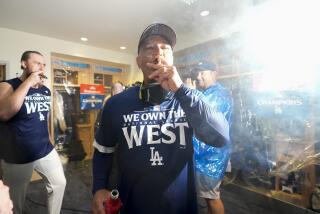Is Primary Just Steppingstone for Roberts, Filner? : Politics: Despite their denials, it is believed impressive showings could propel Filner into a race for Congress and launch Roberts on a campaign for mayor.
- Share via
With one eye on their reelections and the other on next year’s political calendar, San Diego City Councilmen Ron Roberts and Bob Filner hope that impressive showings in this month’s council primary could propel them toward campaigns for higher office in 1992.
Though Roberts and Filner insist publicly that they have no definite plans beyond winning second four-year terms in the Sept. 17 primary, both have already taken preliminary steps toward 1992 San Diego mayoral and congressional campaigns, respectively.
For example, Roberts’ recent use of television advertisements in his district-only race against two lightly regarded opponents simply reinforced speculation within political circles that his reelection race is little more than a warm-up for a 1992 mayoral bid.
Similarly, Filner, though facing what was initially seen as a potentially tougher reelection challenge, has found time to meet with leading Democrats here and in Washington about next year’s congressional campaign.
For both councilmen, the public-relations challenge posed by running one campaign while contemplating another is perhaps more formidable than the opponents they face.
Because, while good politicians, like good chess players, are always looking a few moves ahead, the same anticipatory instincts that win praise in chess can sometimes be seen by voters as overreaching ambition and manipulation.
“My advice to a client is not to start running for office B before winning office A,” San Diego campaign consultant David Lewis said. “Voters’ attitude is, if you really want to run for mayor, Congress or pick a number, then why are you running for council now? Run for what you really want and don’t waste our time or money.”
Throughout their council campaigns, both Filner and Roberts have consistently ducked questions about their future political plans, despite their opponents’ persistent efforts to put them on the defensive over the sensitive issue.
Roberts’ major opponent in his 2nd District contest, former City Hall aide Richard Grosch, has challenged him to publicly commit to serve a full four-year term if reelected, and Filner opponent Andrea Skorepa has thrown down the same gauntlet in the 8th District contest. Neither incumbent has made such a pledge, though each resorts to rhetorical obfuscations to avoid direct refusals.
“This district has had a long history of lack of continuity in its council representation,” said Skorepa, a San Ysidro community leader who serves on the city’s police review board. “It looks like Filner is going to try to continue that trend.”
Similarly, Grosch charges that Roberts is “being dishonest with voters” by not being more forthcoming about his possible mayoral candidacy.
“For him to say nothing’s definite about running for mayor is just a dodge,” argues Grosch consultant Bob Glaser. “It’s obviously something he’s thinking about pretty seriously, and he should be willing to stand up and admit that. That way, people at least know that before they vote this time.”
Through the rhetorical evasions that both employ to sidestep such questions, Filner and Roberts sometimes heighten the very speculation that they hope to quell.
In his standard dismissal, Roberts emphasizes that he has “no plans to leave the council”--a semantic distinction that leaves him plenty of maneuvering room, since even as mayor, he would serve on the council.
“I’m not leaving this city,” Roberts adds. “The one promise I’m making to constituents is that I’m going to continue to get things done for this community. I’m flattered by all the attention on my future, but for now my focus is on winning this election, and nothing else.”
Filner, meanwhile, never fails to remind campaign audiences that he is the first 8th District council member to serve a complete term in two decades--a period in which a succession of his predecessors left for higher office, were forced to resign amid scandal or served as interim appointees.
“I also served a full term on the San Diego school board, so to question my commitment is very strange,” Filner said. “I don’t know what’s going to happen in the future, but I have no plans to do anything other than to continue serving my constituents. If Skorepa wants to criticize me on the basis that I’m qualified for higher office, I’ll take that as a compliment.”
Neither incumbent’s statement, skeptics note, ranks as a Shermanesque denial. “I don’t know anybody who doesn’t expect both of them to run for something else next year,” said political consultant Larry Remer.
Their actions, as well as their words, have raised eyebrows within political circles--none more notably than Roberts’ decision to purchase about $5,000 worth of TV air time for commercials focused on his “Getting Things Done” theme.
Since the advent of district-only council races in 1988--replacing the former electoral system of district primaries followed by citywide runoffs--local political strategists have come to regard TV and, to a lesser extent, radio advertising as, in the words of consultant Tom Shepard, “very expensive and very cost ineffective.”
Because television reaches a citywide audience but council districts cover only one-eighth of the city, broadcast media ads typically reach more people who cannot vote for a candidate than those who can. As a result, most candidates prefer to spend their money on brochures, mailers and other promotional materials that can be targeted to a specific geographic region or constituency.
Roberts’ San Francisco-based consultant, John Whitehurst, notes that the television ads represent a small percentage of what is expected to be a $200,000-plus campaign budget. Nevertheless, the fact that Roberts used them at all--marking the first time that any candidate has done so since the switch to district-only races--has prompted knowing glances among those who believe that an unspoken objective of his council campaign is to build name-recognition and momentum for the citywide mayoral race.
“Why else would you do it?” consultant Remer asked rhetorically. “It’s so transparent that it’s ludicrous. This is nothing more than a flimsy excuse to tell one million people--most of whom can’t vote for him--what a great guy Ron Roberts is.”
Combined with Roberts’ hiring of an out-of-town consultant and the aggressive campaign that he has mounted against rather lightly regarded opposition, the TV ads have convinced many that Roberts not only wants to win, but win big on Sept. 17 for reasons other than returning to City Hall with a mandate for his 2nd District agenda.
Indeed, though most politicians welcome uncontested campaigns, some of Roberts’ backers privately expressed delight when Grosch entered the council race. Viewing Grosch as a credible though easily defeatable opponent, the Roberts aides noted that his mere presence on the ballot helped to justify the kind of hard-charging campaign that otherwise would have been unnecessary--or, if waged, seen as political overkill.
Filner’s flirtation with a possible congressional campaign, meanwhile, began in earnest shortly after four-term Rep. Jim Bates (D-San Diego) was upset last November in the 44th Congressional District. Since then, Filner has discussed the 1992 congressional races--in the 44th District as well as that in a new district that could be created as a result of reapportionment--with top Democratic officials here and in Washington.
Filner insists that those talks have centered on “the importance of the Democratic Party taking back that congressional seat” that Republican Randall (Duke) Cunningham wrested from Bates last year, not specifically on his own potential candidacy. However, others--Bates among them--argue that the two subjects are virtually indistinguishable.
“When Filner says he wants to make sure the Democrats take back the seat, he means so long as he’s the one to do it,” said Bates, who plans to seek either his old House seat or a new one next year, depending on how redistricting alters local congressional districts. “For all intents and purposes, Filner’s running a double campaign.”
While both Roberts and Filner have faced similar questions about their future intentions in their current campaigns, the consensus among political insiders is that those queries pose a slightly thornier dilemma for Filner.
A mayoral bid by Roberts, many observers say, could be accurately cast as largely an extension of his council work, because as mayor, he would continue to deal with many of the same issues. In addition, he could make a strong case to 2nd District constituents that he was not abandoning them, but rather could use the added clout of the mayor’s office to better address their concerns.
As Roberts campaigns door-to-door, many people have, in fact, encouraged him to run for mayor next year. The largely positive response enables Roberts to deflect criticism by half-jokingly noting that his constituents, far from being offended, “kind of like the idea that their councilman might be in line for a promotion.”
“People are pleased to know their councilman, the guy they know best, might be mayor,” consultant Lewis added. “In a way, this could even help his council campaign.”
In contrast, a successful congressional campaign would remove Filner from City Hall, making it difficult for him to use the same strategic tack available to Roberts.
“The difference is that Roberts would move up a floor at City Hall, while Filner would be going 2,000 miles away,” Remer said. “That plays into the sense of abandonment that has always existed in the 8th District, so Filner probably would have to deal with a few more raw wounds.”
But if that question could affect Filner and Roberts differently, the stakes in this month’s primary are identical--and high--for both incumbents.
Though two long shots also are on the ballot in the primaries--magician and frequent candidate Loch David Crane in the 2nd District and South Bay activist Lincoln Pickard in the 8th District--neither is expected to draw many votes away from the front-runners. Consequently, both primaries are likely to produce the 50%-plus victory needed to avoid a November election between the top two vote-getters.
The failure of either Roberts or Filner to win an outright victory in the primary would be a serious political setback to their plans for 1992 or beyond. Not only would a runoff force them to devote seven more weeks and tens of thousands of dollars to the council races--resources that otherwise could be devoted to evaluating or even conducting a future contest--but it also would seriously undermine the image of political strength that both hope to project.
“It wouldn’t necessarily be fatal, but it sure isn’t the way you’d like to begin a bigger campaign,” Lewis said.
Recognizing that fact, both incumbents doggedly insist that their political horizons do not extend beyond Sept. 17--for now.
“Looking ahead to your next battle is no smarter in politics than it is in sports,” Roberts said. “There’s plenty of time to worry about the future. The important thing is to get this one down in the books as a win. Right now, that’s really all that matters to me.”
More to Read
Sign up for Essential California
The most important California stories and recommendations in your inbox every morning.
You may occasionally receive promotional content from the Los Angeles Times.













